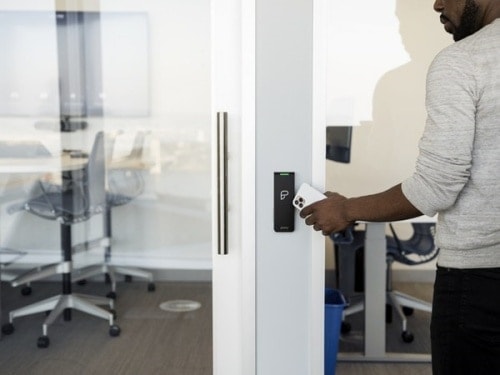Entering the China market this year, San Francisco-based startup Proxy is anticipating strong demand for its smart access solutions in the country as companies turn to contactless keycards for entry into their premises as a result of the COVID-19 pandemic.
As health and safety are paramount concerns for today's businesses and employees, Proxy's contactless mobile access applications improve the hygiene of workplaces while providing a foundation for future smart workplace initiatives.
Contactless smart access solutions potentially eliminating the spread of viruses and bacteria that originate from the touching of access points. This will provide all employees with a better office experience.
"The pandemic has prompted employers to seek more innovative security requirements in the workspace. At Proxy, we hope to lead technology innovations with contactless, smart mobile access products and solutions that empower businesses to enhance their office experiences in the post-pandemic era. By so doing, we not only create business value, but also drive people to focus on smart workplaces,” said Sean Pan, head of Proxy China, said,
In the wake of the new normal, Proxy envisions smart workplaces where employees move around safely, hygienically and seamlessly, using contactless technology:
- entrance doors will be opened via a user's mobile device rather than keycards
- tablets installed with visitor management application software will seamlessly register body temperature readings for each person entering the workplace
- meeting rooms will be equipped with endpoint sensors using Bluetooth technology to detect employees or visitors entering the workspace and greet them with a personalised message.
Sensors will monitor room capacity to allow enforcement of social distancing requirements; and intelligent sensing devices will automatically adjust ambient temperature, lighting, and other conditions based on the detected density and distribution of people, with all data transmitted to a cloud-based management platform.
Online design platform provider Canva is one of the company’s early adopter is China, deploying Proxy’s mobile access solution at its offices at Beijing Vanke Times Center.
"Proxy offers a unique, light mobile access solution that fits our needs perfectly. With this cloud-based solution in place, our staff can now use their mobile devices to provide streamlined, secure access to the building and their offices. Not only is this a convenient, contactless solution, but it also aligns with our company culture and flexible working hours," said Chris Wang, senior internal architecture engineer at Canva.
Value of localisation
Combining global standards and local support, Proxy provides solutions that are customised to address customers' different needs in various scenarios, providing purpose-designed solutions for multinational companies, as well as organizations with multiple office sites.
Realising the value of localisation to cater to the needs of the local market, Proxy has developed in China a dedicated local product service team, and also launched a domestically hosted cloud platform, as well as local support for the Android system and WeChat mini-programs. All of these capabilities have been developed to ensure the requirements of local customers are fully satisfied when using Proxy solutions.
“We're creating a unique identity signal for everyone on the earth that's universally accessible, secure, and private,” said Denis Mars, co-founder and CEO of Proxy. "We want to live in a world where every object around us can securely recognise our physical presence with our permission to provide us with a frictionless experience, personalized to our individual needs and preferences.”
Unlike traditional access systems, Proxy's mobile access solutions taps Bluetooth built into every smartphone, with access granted and managed via the cloud. This method makes access easier, as well as more efficient, secure and reliable. In addition to smart mobile access products, Proxy also provides solutions for smart visitor and space management, based on contactless technology.
Proxy has passed a number of globally recognised data security and privacy certifications, including the EU General Data Protection Regulation (GDPR) and SOC 2 security audit. Proxy's cloud service is currently deployed across the world, with servers based in numerous regions to guarantee the security and access of customer data.
Founded in 2016 in San Francisco , Proxy counts many companies as customers, including Uber, Accenture, Harmay, Shui On Land and WeWork that have deployed the frictionless smartphone-based access.



